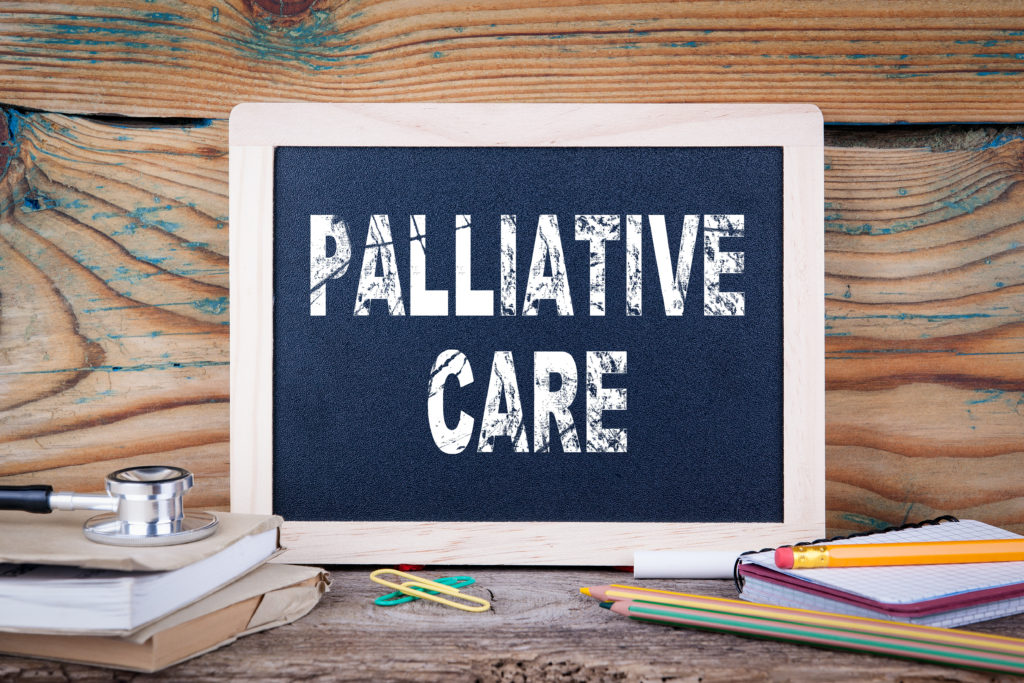
Palliative Medicine physicians are physicians that specialize in maximizing quality of life by managing distressing symptoms and providing an extra layer of support for patients and families.
At Virginia Cancer Specialists, we are committed to providing the highest quality care for our patients, which means ensuring access to expert palliative care. Palliative care is concurrent, synergistic care, to help you live better throughout your cancer journey.
⇒ SYMPTOM MANAGEMENT: Helping you live better with serious illness
Many patients are unfamiliar with palliative care and often mistakenly equate it with hospice and end-of-life care. In reality, palliative care is a medical sub-specialty aimed at maximizing quality of life by managing distressing symptoms and providing an extra layer of support for patients and families. This is needed throughout the course of a serious illness, regardless of disease status. Patients with cancer may have symptoms that arise from cancer itself, or from therapies aimed at treating cancer. Distressing symptoms are not limited to pain, and may include things like:
- fatigue,
- decreased appetite,
- nausea,
- constipation,
- diarrhea,
- shortness of breath,
- neuropathy,
- cough,
- insomnia,
- anxiety, and depression, among others.
When you are uncomfortable, your focus can change to just getting by, and you may not have the energy to participate in things that you normally enjoy. Sometimes the cancer treatments cause side effects that make it difficult to continue them, and may result in doses being decreased or therapies being changed. However, when symptoms are controlled, quality of life, adherence to cancer therapies, and survival are improved.
Your primary cancer team will always provide care for your symptoms. However, when symptoms become more burdensome, or challenging, palliative care providers are experts, and partner with your cancer team to optimize symptom support. They work synergistically to help manage symptoms and allow for the best possible treatment and outcomes. Studies have shown that palliative care can help patients have better outcomes, and even live longer.
⇒ COMMUNICATION: Helping you match treatment options to your goals
In addition to helping manage physical symptoms, palliative care providers are also experts at communication. Providers spend time with you and your loved ones, to review your condition in a holistic way in order to help ensure individualized treatment plans that honor your wishes and priorities. We ensure that your cancer team knows and understands what the highest quality of life means to you.
Treatment Intent
Treatments for cancer are sometimes given with expectations of cure, and are sometimes given with the understanding that the illness cannot be cured, and the goal of treatment is to aim to prolong life with quality.
Curative intent
For many cancer patients, treatment goals are aimed at cure and complete eradication of the cancer. In this setting palliative care specialists work to help manage physical symptoms of the cancer or treatments and allow you to tolerate the most effective therapies. In this way they help to synergize with your treatments.
Supportive intent/life prolongation
For patients with advanced cancer, treatment may be not be able to completely cure the illness, and goals may be to prolong life with quality. In this setting the role of palliative care is still to help manage physical symptoms and allow you to tolerate the best possible therapy. However, if treatment burdens begin to outweigh the benefits, and begin to decrease quality of life, palliative medicine specialist continue to manage symptoms and optimize quality of life, even when standard treatments such as chemotherapy and radiation are no longer effective. They also counsel families on the timing of hospice when appropriate.
⇒ A TEAM APPROACH
Palliative medicine providers work in a collaborative model, and always communicate with your primary oncologist, radiation oncologist, surgeons, and other team members involved in your cancer care. Additionally, specialized social work support is available for help with adapting, coping, counseling, practical considerations, and resources.
In palliative care, the social worker plays an integral role in providing emotional support to patients and families. In collaboration with the palliative care physician, the social worker uses nonpharmacologic interventions to help patients and families learn ways to manage distress and ease suffering. The social worker engages in conversations about goals of care and shares information on advance directives. By assessing the patients’ strengths and needs, the social worker can assist in accessing resources and develop support so that patients can live their lives fully.
| |
Palliative Care vs Hospice: What’s the difference?
|
| |
Palliative Care |
Hospice |
|
| When does it start? |
Can begin at the referral of a physician at any time, at any stage of illness, serious to end-stage. (Think of a referral to a palliative medicine specialist like a referral to a cardiologist. The palliative medicine doctor helps to co-manage difficult symptoms and provide support.) |
Begins when 2 physicians certify that they believe the patient likely has less than 6 months to live if the disease follows its usual course. |
|
| What does it do? |
Is supportive care aimed at managing symptoms, providing psychosocial support, assisting with understanding treatment options, and optimizing quality of life. This care may be given alongside other curative or life prolonging therapy. |
Is supportive care aimed at managing symptoms, providing psychosocial support, and optimizing quality of life through the end of life, and is no longer seeking or responding to curative therapy. |
|
| What is the priority?
(This is always patient determined!) |
Symptom control with priority of function:
Help treat symptoms from cancer or from cancer treatments:
Pain
Nausea
Decreased appetite
Fatigue
Depression/anxiety |
Symptom control with priority on comfort
At end of life, when time is short, comfort may outweigh attempts to optimize function. |
|
| Where do patients get it? |
Is typically provided in an office setting, nursing facility, or hospital. On rare occasions palliative care providers do home visits. |
Is typically provided in a home or home like environment such as a nursing facility wherever the patient calls home. |
|








